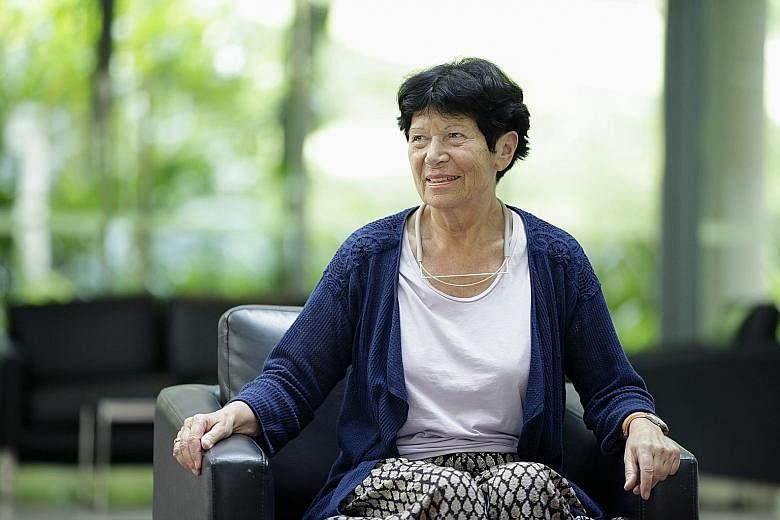If you ask Austrian sociologist Helga Nowotny which historical period she would like to have lived in, you will get a resounding "Now!"
Dr Nowotny, 78, is Professor Emerita at top international technology and natural sciences university ETH Zurich, which has a research centre here, as well as a founding member of the European Research Council, and its president from 2010 to 2013. The council funds and supports top researchers everywhere, especially those whose experiments involve diverse disciplines.
A prolific researcher, she released her latest book, The Cunning Of Uncertainty, in January. In her work, Dr Nowotny probes in particular how pervasive technology today is changing the way people regard themselves, make friends, look upon others and produce new knowledge. In an exclusive interview during her recent trip here as a visiting professor at Nanyang Technological University, the divorced grandmother of two said: "Science has exploded and technology continues to increase at a fantastic rate. Now, we have the ability to look into the past and a limited ability to look into the future."
That, she noted, comes in an age of much volatility, and, she said: "While you cannot prepare for something you don't know, you can prepare for something unpredictable to happen."
In that light, what then does she make of the Government recently committing a record $19 billion to R&D, over the next five years?
-
PROFESSOR HELGA NO WOTNY ON...
-
How Singapore compares with other global cities
"There are many smart cities but only one smart nation, and that is Singapore, because it is smart, compact and, well, it is a nation."
Why the most successful companies keep innovating
"They do so because when you keep repeating that nice product you have, errors can come in and grow. Then you say 'Well, I have a problem' and innovate."
How to stay curious
"Children ask all these wonderful questions, like why the sky is blue, that can drive parents nuts. But when they go to school, their curiosity drops… So encourage them to play, not take everything as a given and enjoy making a contribution to change the world, at least a little."
Looking youthful at 78
"I very much like what I do, and have been fortunate to have the independence of choosing to do what I like to do. Sometimes I've had to pay a price for doing so, but it keeps me going."
Cheong Suk-Wai
To begin with, she said at least 10 per cent of all that money, and 10 per cent of the country's brightest scientists, should go towards "frontier research", or studies with no specific purpose in contrast to, say, research aimed at curing eczema or ending dengue. "It is about seizing the opportunities of tomorrow," she said. For example, she pointed out, frontier research into how bacteria fought off viruses led to the creation of the new gene-editing tool CRISPR, with which scientists can snip off strands of DNA that carry disease from the genes of a baby so that he will never have to suffer the illnesses his parents have.
When told that most taxpayers would frown on her recommendation that at least $190 million be spent on research with no real end in mind, she said: "Anything below 10 per cent of your budget would not change anything much because you need a critical mass (of data). And it needs to be long term, so you have to be patient."
All that money, talent and time would not be enough to put Singapore ahead in global R&D, though, she said. Society here also needs to evolve to be receptive to fresh ideas.
To bring that about, she suggested that everyone here, especially the young, be given more time and space to play. "Everyone has this experience that you try to figure out something and it does not come to you. Then you go for a walk, play music or think of something completely different and, all of a sudden, the brain answers the question you had. So, follow how the brain works."
At the same time, she said, organisations and other social systems also need to support such "playfulness". For example, digital giant Apple takes 100 people yearly under its fold and "lets them loose to play with ideas" on the question: "What is it you find interesting?"
She added that other top IT firms have long been giving their prototype gadgets to geeks to try out and give their feedback: "You want to be engaging people in a more active way so that they are helping to shape technology."
After winning people around to playing with ideas and being more curious about everything around them, the next step would be to stoke entrepreneurship, she said.
At ETH Zurich, its students not only enjoy building little robots, but also invite industrialists to their robot-building competitions so that they can see for themselves the possibilities of technology. "They get interested and then take some of these young people into industry, along with their skills, knowledge and entrepreneurial spirit."
The rub, she noted, was when bureaucrats, if not taxpayers, demanded useful results fast for all their investment in R&D. After all, breakthroughs often take more than the five years given for the $19 billion investment. She said: "There is this concept of low-hanging fruit, which is very pragmatic." That includes doing certain projects that would address society's most pressing needs.
So, she said, researchers should engage more with everyone else to make them aware of their experiments. In Europe, for example, there are regular science fairs open to all, fun TV programmes on science for toddlers and all sorts of small-scale experiments, or pilot projects, for people to test the ideas and end such projects quickly, easily and relatively cheaply if they failed.
She stressed: "It is necessary to tell policymakers and the public that there are also other fruit, and you have to do a bit more work to cultivate such fruit before you can pick them."


